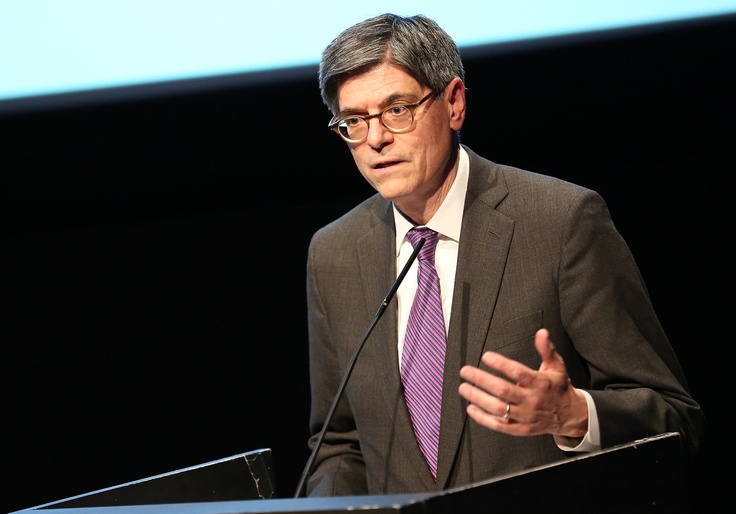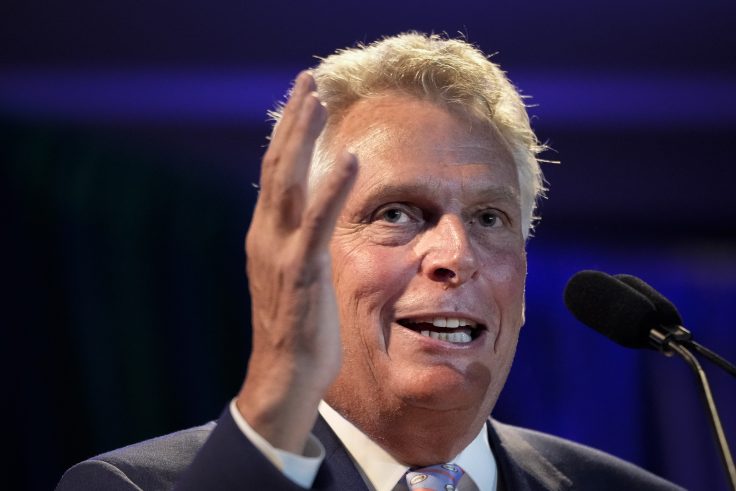Soros-Funded Groups Call on Biden To Ignore China’s Abuses in Order To Fight Climate Change
Signatories also took money from groups with ties to Chinese Communist Party
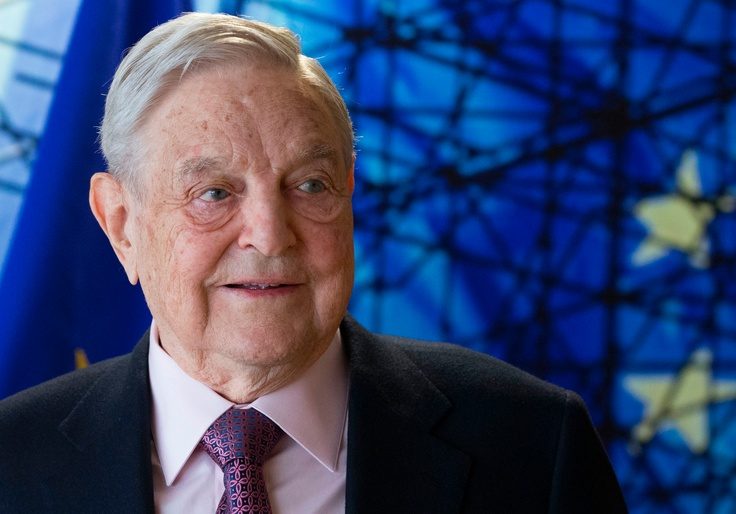
Progressive groups backed by billionaire George Soros and several liberal philanthropies are calling on President Joe Biden to ignore China's human rights record and partner with the Communist regime to fight climate change.
Forty-eight progressive organizations issued the letter to Biden this week, including prominent outfits like CODEPINK, Sunrise Movement, the Union of Concerned Scientists, and ActionAid USA. The groups accuse the White House and Congress of taking an "antagonistic approach" to U.S.-China relations that will serve as a "major barrier" to cooperation on climate change. Several of the groups have taken money from liberal organizations that have funded Chinese government-linked programs.
"We are deeply troubled by the growing Cold War mentality driving the United States' approach to China—an antagonistic posture that risks undermining much-needed climate cooperation," reads the letter, published by Politico.
The letter could open the groups and their progressive donors up to allegations of hypocrisy. While the organizations say they support human rights and pro-democracy causes, the letter glosses over China's human rights record and its ongoing crackdown on pro-democracy groups. The letter makes only one passing reference to "human rights" and is far more critical of the United States than China. China has carried out genocide against Uyghur Muslims in western China, and Chinese authorities have cracked down on pro-democracy groups in Hong Kong.
Some of the biggest progressive philanthropies in the country fund groups that signed on to the letter. Soros's Open Society Foundations gave $500,000 in 2019 to the Sunrise Movement, which supports a number of left-wing causes, including defunding the police. Democracy PAC, which is heavily funded by Soros, contributed $250,000 to Sunrise's political action committee in April 2020.
The Rockefeller Brothers Fund contributed $100,000 to the Sunrise Movement Education Fund in 2019. The Rockefeller philanthropy has funded numerous China-based environmental nonprofits with links to the Chinese Communist Party. The Washington Free Beacon reported in January that the Rockefeller Brothers Fund gave $400,000 to the China Environmental Protection Foundation, $750,000 to the China Council for International Cooperation on Environment and Development, and $200,000 to the China Youth Climate Action Network, all of which have links to Communist Party officials.
Soros's group gave nearly $11 million from 2016 to 2019 to Global Witness, a progressive investigative news organization that also endorsed the letter. The Ford Foundation, one of the largest philanthropies in the country, gave $7.8 million to Global Witness from 2006 through this year. The Ford Foundation recently gave $2 million to Chinese universities linked to the Chinese military, the Free Beacon reported. The charity also funds a journalism center at Howard University that recently hired controversial journalist Nikole Hannah-Jones.
ActionAid USA, a signatory to the letter that claims to fight poverty and injustice, received $175,000 from the Rockefeller Brothers Fund from 2016 to 2018. Open Society Foundations gave ActionAid $40,000 in 2019.
The Biden administration has struggled with how to balance confrontation with China over its human rights record while developing dialogue with Beijing on the climate change issue. China is seen as a key partner in the climate change fight due to its carbon emissions, population size, and industrial capacity.
Some policymakers want the administration to take a more aggressive approach toward China on issues like detention camps for Uyghur Muslims in western China, the crackdown on pro-democracy groups in Hong Kong, and investigations into the origins of the coronavirus.
John Kerry, the administration's climate czar, has faced criticism for saying that he has avoided discussing hot-button issues with his Chinese counterparts during discussions about climate change strategy. He suggested in April that China's ongoing genocide against Muslim Uyghurs in western China should "not get in the way" of a U.S.-China climate agreement.
Kerry conceded in congressional testimony in May that China relies on Uyghur slave labor to build solar panels.
Blumenthal and Wife Have Six-Figure Investment in Chinese Government-Linked Retail Center
Wealthy Democrat says he was unaware of Chinese investment until contacted by the Washington Free Beacon
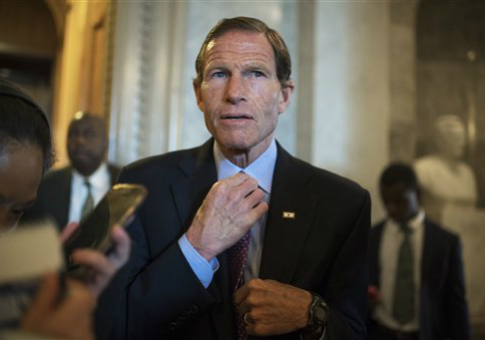
Sen. Richard Blumenthal (D., Conn.) and his wife Cynthia have a six-figure investment in a massive retail shopping complex in Shanghai that is part of a partnership between a Chinese government-controlled business consortium and Disney.
The Blumenthals have an investment of between $100,000 and $250,000 in U.S. Shanghai LLC, according to the senator’s annual financial disclosures. U.S. Shanghai LLC is a subsidiary of Malkin Properties, a company owned by Blumenthal’s brother-in-law, Scott Malkin. The company partnered in 2014 with the state-owned Shanghai Shendi Group to build Shanghai Village, a 592,000-square-foot luxury shopping resort next to Shanghai Disneyland. The Blumenthals are also invested in U.S. Suzhou LLC, another Malkin-owned shopping center near Shanghai.
A spokeswoman for Blumenthal said the senator was unaware that he and his wife are invested in the venture until contacted for comment by the Washington Free Beacon. Maria McElwain, a communications director for Blumenthal, said Blumenthal’s wife, Cynthia Malkin Blumenthal, is a passive investor in an investment vehicle controlled by her brother’s company. McElwain said Cynthia Blumenthal "has no control, influence, or discretionary power" over the Shanghai investment. She also said the Blumenthals have not discussed the investment with Malkin.
But the investment could pose a political liability for Blumenthal, who is up for reelection next year. American firms’ investments in China have come under increased scrutiny due to concerns the Chinese government is using its partnerships to exploit the United States. Blumenthal’s apparent lack of awareness of the investment is also a possible testament to his vast wealth. Blumenthal is one of the richest members of the Senate.
Corporate filings in Connecticut show that U.S. Shanghai LLC was formed on Feb. 4, 2014. The Blumenthals bought a stake in the company worth between $15,000 and $50,000 on Aug. 7, 2014. They purchased another stake in 2019, which was disclosed in Blumenthal’s annual financial disclosure report last year.
Former attorney general William Barr criticized Disney last year for its partnership with the Shanghai Shendi Group, the company also working with Malkin Properties. Shanghai Shendi is a consortium of three state-owned companies: Shanghai Radio, Film, and Television Development Company; Jin Jiang Hotels; and the Lujiazui Group. Barr said more than 300 employees at the Disney theme park were part of the Chinese Communist Party.
Disney is one of several American companies that comply with Chinese government edicts in order to continue doing business in China. The New York Times reported in 2016 that the Shanghai Shendi Group met with Disney executives to approve which theme park rides would appear at the resort. The Times reported that Disney opted against deploying classic Disney rides like Space Mountain and Jungle Cruise.
DO A SEARCH FOR FEINSTEIN AND WAR PROFITEERING - RED CHINA, CHINESE SPY
Cotton: Lefty Groups Urging Biden ‘To Look the Other Way’ on China’s Genocide for Climate, It ‘Sounds Like Chinese Propaganda’
On Thursday’s broadcast of the Fox News Channel’s “America’s Newsroom,” Sen. Tom Cotton (R-AR) said that a letter from left-wing groups urging President Joe Biden to make cooperating with China on climate a priority over taking a hard line on other issues “sounds like Chinese propaganda,” and slammed those “willing to look the other way” on China’s genocide against its own people in the hope China will cut emissions.
Cotton said, [relevant remarks begin around 4:30] “That letter sounds like Chinese propaganda, Dana. The Chinese even have a word for this…it translates loosely [to] ‘white liberal,’ people who are only concerned about things like immigration and the environment and who are willing to sacrifice American jobs and America’s prosperity, willing to look the other way [on] genocide against China’s own people, all for some hope that China might one day reduce its emissions from its factories. We need to crack down on China. They unleashed a pandemic on the world. They’ve been cheating America’s workers for decades. It’s time to lower the boom on the Chinese Communist Party, not to look the other way in hopes of climate change promises that are never going to come to pass.”
Follow Ian Hanchett on Twitter @IanHanchett
More indicators that China is preparing for a hot war
When I heard that websites were claiming that a “top Japanese leader” had said that he feared that China was preparing a Pearl Harbor-style attack against the U.S., I assumed that this story came from clickbait sites and was ready to discount it. However, Thomas Lifson caught up with the fact that this wasn’t clickbait at all. Instead, it came from Japan’s State Defense Minister, who warned that China and Russia are partnering to threaten all sorts of Pacific bases, from Hawaii to Taiwan.
The same article from Thomas Lifson also quoted Andrew Bolt’s essay in the Melbourne Herald-Sun about the Nazi-esque echoes in the celebrations in Beijing for the 100th Anniversary of the Chinese Communist Party. In addition to goose-stepping soldiers and displays of China’s massive military might, Bolt noted that Xi’s speech was decided bloodthirsty:
It was frightening enough that Xi threatened “foreign forces” he’d “crack their heads and spill blood”.
Worse, was that in paragraph after key paragraph he pushed the same buttons Hitler pushed in his speech in 1937 on the fourth anniversary of his Nazi dictatorship.
All the same evils are there. The appeals to race. The paranoia. The inflammatory poking of a mortified national pride. The fake appeals for peace, and gory threats of blood. That sound of a whiner, grown big and now scary-daring himself to fight.
To add to that scary “It’s 1939 all over again” vibe, veteran China watcher Gordon G. Chang is writing about the way that Beijing is taking steps that indicate China intends to invade India:
China in recent weeks has sent tens of thousands of troops to its disputed border with India in Ladakh, high in the Himalayas.
Beijing looks as if it is preparing for a full-scale invasion of Indian territory.
[snip]
In May of last year, the People’s Liberation Army moved troops south of the Line of Actual Control in Ladakh, in other words, into Indian-controlled territory. A month later, on the night of June 15, Chinese soldiers launched a surprise attack, killing 20 Indian troops.
India responded by reinforcing its forces and launching a counterattack in August. China then added to its troop count, increasing the number of soldiers from 15,000 a year ago to 50,000 at this moment. Beijing has also brought advanced weapons to the area and began building bases.
Ladakh is not the only Himalayan hotspot. There is a Chinese encroachment in India’s Sikkim as well as incursions in neighboring Bhutan and Nepal.
In the same article, Chang notes that even the Washington Post sees cause for concern in China’s actions and Xi’s words:
Beijing looks as though it is even thinking of using nuclear weapons to fight the next war.
The Washington Post reported China appears to be building, in an area covering more than 700 square miles in the Gansu desert, 119 missile silos for the ten-warhead DF-41 intercontinental ballistic missile. When added to 26 more silos the Chinese military is building elsewhere, China could soon be housing from these fixed locations about as much firepower as the existing U.S. nuclear arsenal. When China’s missiles carried on mobile launchers and submarines are added, China’s warheads could end up exceeding America’s.
Because Beijing already has a sufficient number of nukes to deter others — China has had for a long time sufficient weapons for a so-called “minimal deterrent”— it looks as if Chinese military planners are thinking of using nuclear weapons in an offensive capacity. China’s flag officers and political leaders have in public threatened to use their arsenal in this way.
I don’t think China is planning to wage war. I think China is already waging war. It began with industrial espionage, moved to using prison and slave labor to undercut Western manufacturing, and then bought up the world’s politicians, tech tyrants, and industrialists, either with straight cash bribes or with the promise of unparalleled riches from the Chinese market.
The fourth phase was COVID. China might not have meant to release it in 2020 (that might have been a careless accident), but it was always intended as a weapon of war. Any collateral damage in the form of Chinese civilians deaths was never going to be a problem: With 1.6 billion people, China could afford to lose a few million. Anyway, its harsh quarantining process (locking people up to die as a medieval lord would have) meant it could control the disease. Remember that, even as it quarantined Wuhan, it made sure to allow its citizens to travel around the world.
Now, with its addled puppet in the White House, rather than Donald Trump, our military focused on transgenderism and race wars, and leftists’ lunatic insistence that Biden must yield to China to prevent climate change, China knows that it has free agency to wage a hot war, instead of a cold war or biological war. To say that we are living in dangerous times doesn’t even begin to address what’s happening here.

IMAGE: China Communist Party 100th Anniversary celebration. YouTube screen grab
Obama’s Man in China Now Beijing’s Man in Washington
Former ambassador Baucus appears regularly on Chinese propaganda outlets
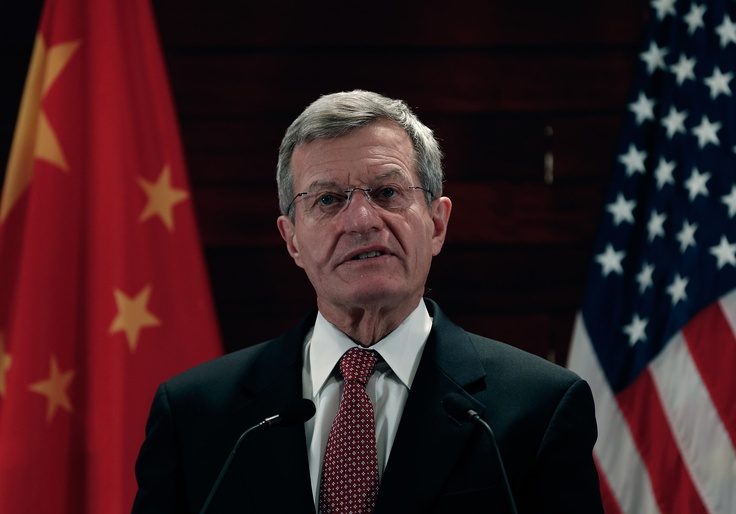
As the novel coronavirus wreaks havoc across the world, the Obama administration's ambassador to China has found a second lease on life as a pro-China talking head on regime propaganda outlets.
Former ambassador Max Baucus has given at least four different interviews to Chinese propaganda outlets in the last two weeks, repeatedly comparing the U.S. rhetoric about China to both the McCarthy era and Nazi Germany.
"Joe McCarthy [and] Adolf Hitler … rallied people up, making people believe things that were really not true," Baucus said during a May 12 interview with China Global Television Network (CGTN), a regime mouthpiece. "The White House and some in Congress are making statements against China that are so over the top and so hypercritical, they are based not on the fact, or if they are based on fact, sheer demagoguery, and that's what McCarthy did in the 1950s."
Since his retirement in 2017, Baucus has been a reliable critic of the Trump administration's increasingly confrontational China policy—chiefly the decision to wage a trade war with Beijing. He once warned that the White House's decision to impose additional tariffs was a "slap on the face" to China. But Baucus's recent comments in the pandemic era have been more sympathetic to China—and critical of the United States—than ever before.
His post-retirement public statements praising China have coincided with his burgeoning overseas investments. In 2017, he founded the Baucus Group, a consulting firm that advises both American and Chinese businesses, according to his U.S. Chamber of Commerce biography. He also sits on the board of directors for Ingram Micro, a U.S. subsidiary of a Chinese state-owned conglomerate, as well as the board of advisers for Alibaba Group, one of China's largest tech companies.
Walter Lohman, director of the Asian Studies Center at the Heritage Foundation, said that it was "inappropriate" for a former ambassador to speak ill about his own government on a foreign propaganda outlet.
"It's like going to China and … talking about your own government that way in meetings. I think that would be pretty inappropriate," Lohman said. "So it would be inappropriate speaking on state media."
Baucus's public statements have received considerable attention from Beijing's propaganda outlets. When the former ambassador compared President Donald Trump's criticism of China to rhetoric used by Adolf Hitler and Joe McCarthy during a May 6 interview with CNN, Chinese propaganda outlets quickly amplified Baucus's comments about how Trump was "a little bit like Hitler in the '30s" and that Americans were worried about "getting their heads chopped off" if they voice their disagreement with the U.S. government's China policy. Xinhua News Agency, a state-owned outlet, extensively cited Baucus's attacks in a May 8 article, using it as evidence that the Trump administration is attempting to "deflect criticisms about their blunders by blaming China." The article was syndicated in party-controlled mouthpieces such as Global Times and People's Daily, according to the Investigative Research Center.
Baucus then appeared on CGTN on May 12 to double down on his Hitler and McCarthy comparison, blaming the Trump administration for flaming "sheer demagoguery."
"[The current U.S. rhetoric] is somewhat reminiscent, nowhere close to that yet, somewhat reminiscent of the McCarthy era and somewhat reminiscent of Germany in the 1930s," he told CGTN.
The former ambassador also gave an exclusive interview to Global Times on May 14, where he said Secretary of State Mike Pompeo's claim that the virus may have originated in a Wuhan laboratory "makes no sense" and accused both Democrats and Republicans of being tough on China to score political points in an election year.
Baucus again appeared on CGTN on May 15, where he claimed that America is "sliding toward a form of McCarthyism" because the Trump administration is pressuring policymakers to be tough on China. The former ambassador did another CGTN media hit on May 16, this time appearing alongside his wife Melodee Hanes, who blamed the presidential election for making dialogue "difficult."
"There are a lot of pretty smart people in the United States who are not speaking up. People in office, moderates, especially moderates on the Republican side," Baucus said on May 15. "They are afraid to speak up, they are intimidated, intimidated by President Trump. And it's kind of sliding toward a form of McCarthyism—how it is politically incorrect to speak the truth, speak the truth to power."
When the Washington Free Beacon called the phone number listed for Baucus's home address, no one answered. A lawyer representing Baucus Group, the ambassador's consulting firm, also did not respond to a request for comment.
While Baucus rarely enjoyed this much attention from Chinese state media outlets after his retirement, this is not the first time he has spoken to Chinese media outlets in recent years. Baucus also gave an exclusive interview to People's Daily in March 2018, criticizing U.S. tariffs on Chinese goods as the "wrong policy" and "too confrontational." He has also spoken at events backed by the China-U.S. Exchange Foundation, a registered foreign agent of the Chinese government according to a 2018 congressional report.
Lohman, the Heritage Foundation expert, said that while Baucus has the right to appear on any domestic and foreign outlets, he should not have addressed a propaganda outlet with the same degree of candidness that he did with CNN.
"I think he must have gotten wrapped up in the media performances because when you shift from CNN to Global Times or CGTN, you've gone to an entirely new level," he said. "And there I think you just have to express yourself differently. It's not an appropriate place to air political differences."
